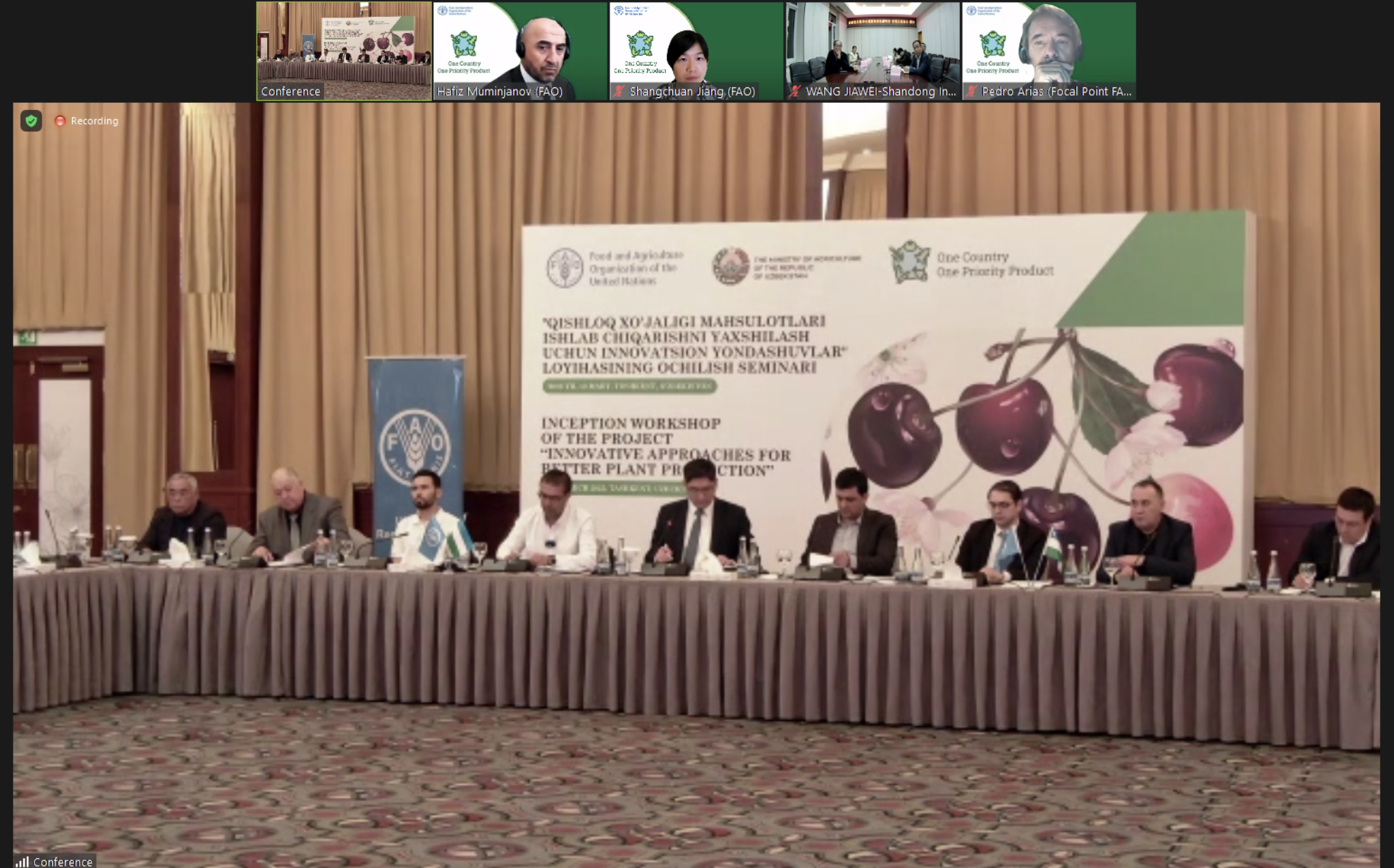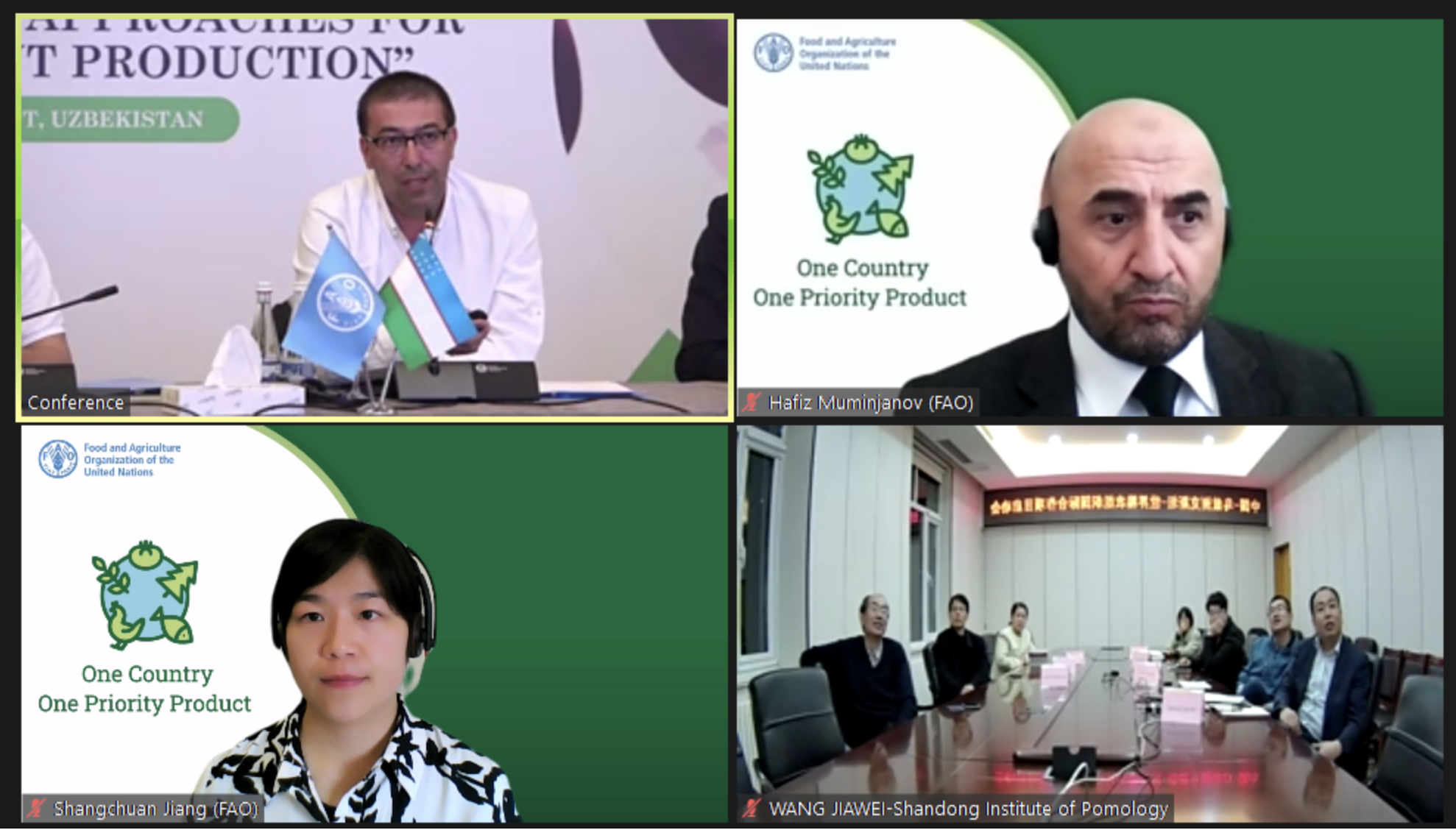News
Uzbekistan promotes sweet cherries at OCOP project inception workshop

Tashkent - Under FAO’s OCOP Initiative, the Government of Uzbekistan selected sweet cherry as a Special Agricultural Product (SAP). Favourable climate and geographical conditions for their production, relatively low input costs, numerous smallholder producers in every region of the country, seasonal advantage over local suppliers in export markets, as well as availability of cool storages and transportation companies in the regions make sweet cherries among the most important and widely grown fruits in Uzbekistan.
The objectives of this Inception Workshop were to raise awareness of the importance of implementation of the OCOP in supporting small-scale farmers, Country Programming Frameworks (CPF), FAO Strategic Framework 2022-31, and the UN SDGs for the 2030 at national level. This workshop also aimed at gathering support, participation and promotion of the implementation of FAO country project on OCOP by the FAO community and relevant stakeholders.

Sherzod Umarov, Assistant FAO Representative in Uzbekistan acted as the moderator for this workshop, and delivered opening remarks, followed by a welcome address by Kyrgizboev Fakhriddin Dekhkonovich, Head of the Department for the Development of Fruit and Vegetable Growing, Viticulture, Melon and Potato Growing. Next, Hafiz Muminjanov, Technical Adviser, FAO Plant Production and Protection Division (NSP), shared the key elements of the Global Action on the OCOP, while Shangchuan Jiang, Project Manager, FAO NSP, shared the FAO FMM Project Objectives and Activities.
In addition, Pedro Marcelo Arias, Economist, OCOP Regional Focal Point and part of the FAO Regional Office for Europe and Central Asia (FAOREU) discussed the Regional Organization Plan on the Implementation of OCOP in Europe and Central Asia. Next, the project workplan at the country level was shared by Mr. Khurshid Norov, M&E Specialist, OCOP project Focal Point, FAO Uzbekistan. Then finally, a presentation on the selected SAP of sweet cherry was given by Mr. Shukhrat Abrorov, Director of the “FRUIT HOUSE ORGANICS” consulting firm. Presentations were followed by an open and engaging discussions.
The selection of sweet cherry as special agricultural product is very meaningful in Uzbekistan: its wide agro-ecological adaptability and versatility, significant value addition and investment potential and profitability and rural household poverty alleviation are some of the key deciding factors. Moreover, smallholder farms are the largest producers of agri-food products - including sweet cherry - in the country, with 70% of the total horticulture output.

Apart from commercial gardening, this fruit is widely grown in all homesteads across the country. Sweet cherry cultivation is mostly under family farming and women are involved in the production and processing. Homestead gardens and fields in Uzbekistan are multi-crop agroecosystems that provide owners with food (especially fruits and vegetables), timber, fuelwood, and income. Actually, despite its above-mentioned advantages, there are some key challenges in this sector.
Some local sweet cherry varieties may not be well known or competitive for global markets, reducing their demand in favour of more commercially available ones. Standardization and phytosanitary regulations may also pose some challenges to sweet cherry exports, causing farmers to miss the seasonal peak for trade, which usually provides better incomes. Lastly, small size farmers and their fragmentation in production of sweet cherries prevent leveraging the strengths of production and export capacity of the horticulture sector, including sweet cherry sub-sector, so the fragmented farmers may not be able to meet internationally accepted standardization, quality and volume requirements prevail in export markets.
One Country One Priority Product (OCOP): https://www.fao.org/one-country-one-priority-product/en
FAO Regional Office for Europe and Central Asia: https://www.fao.org/europe/en/
Uzbekistan Press Releases:
